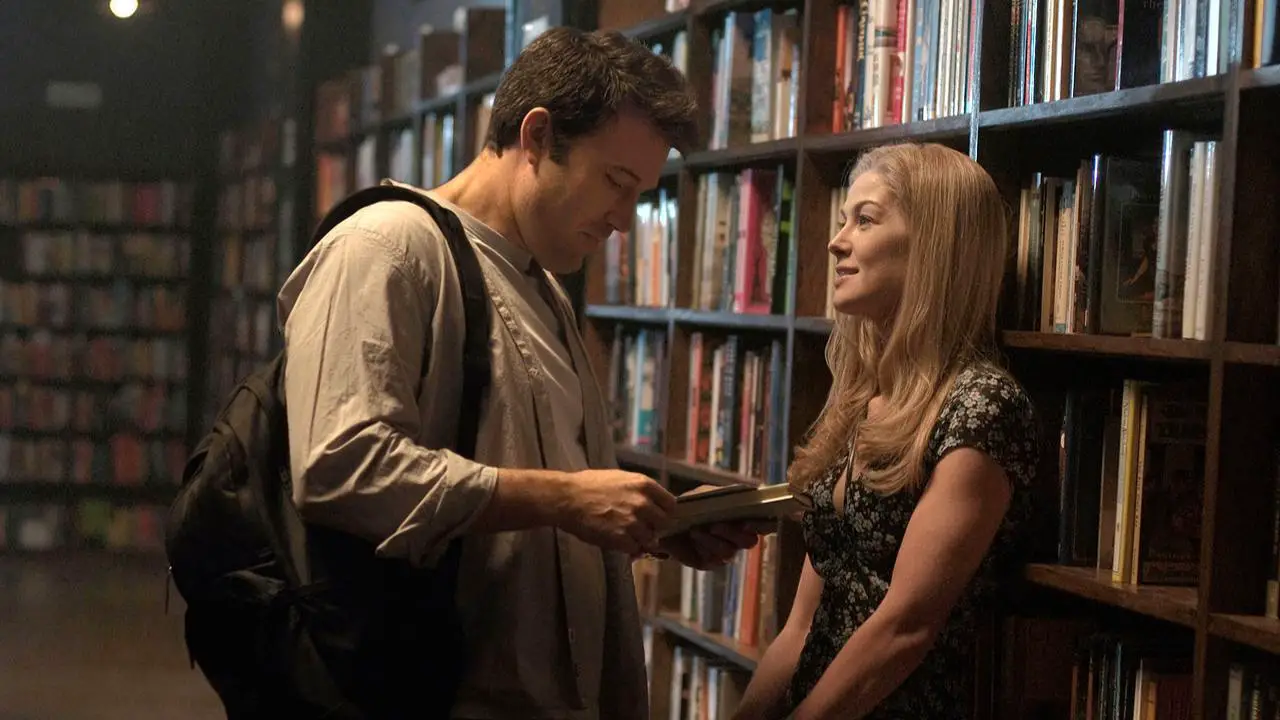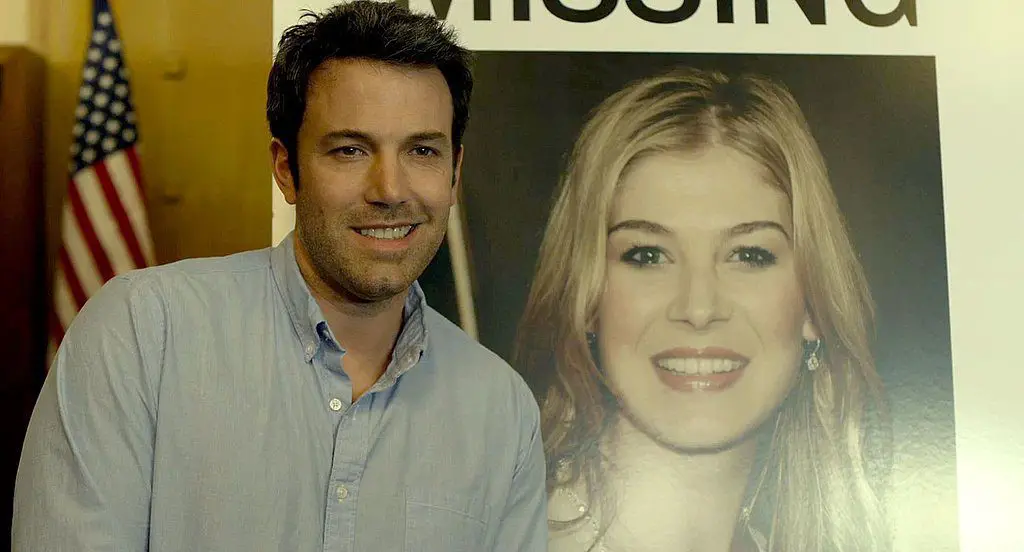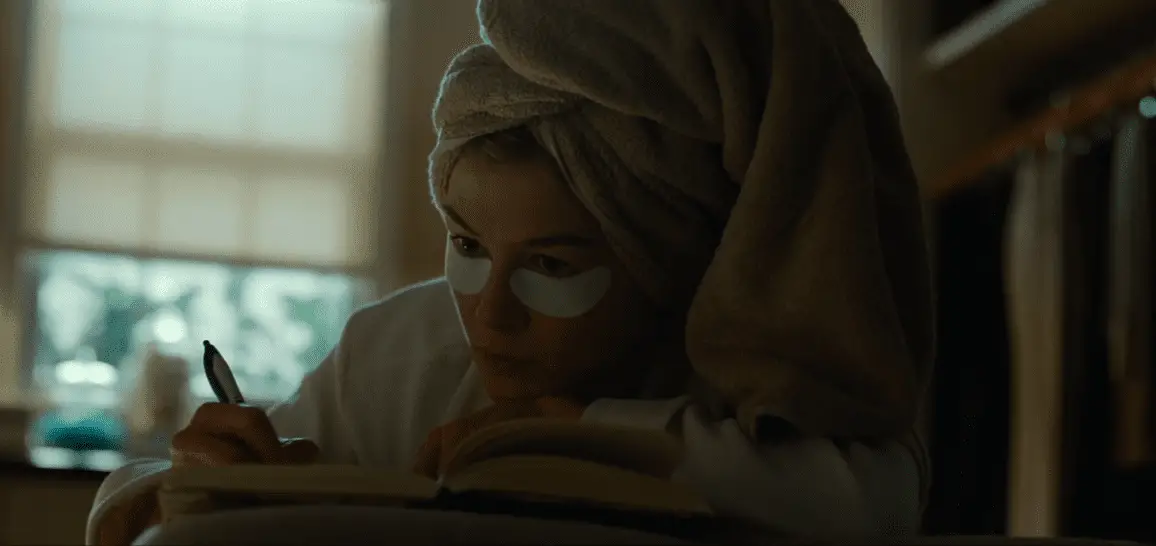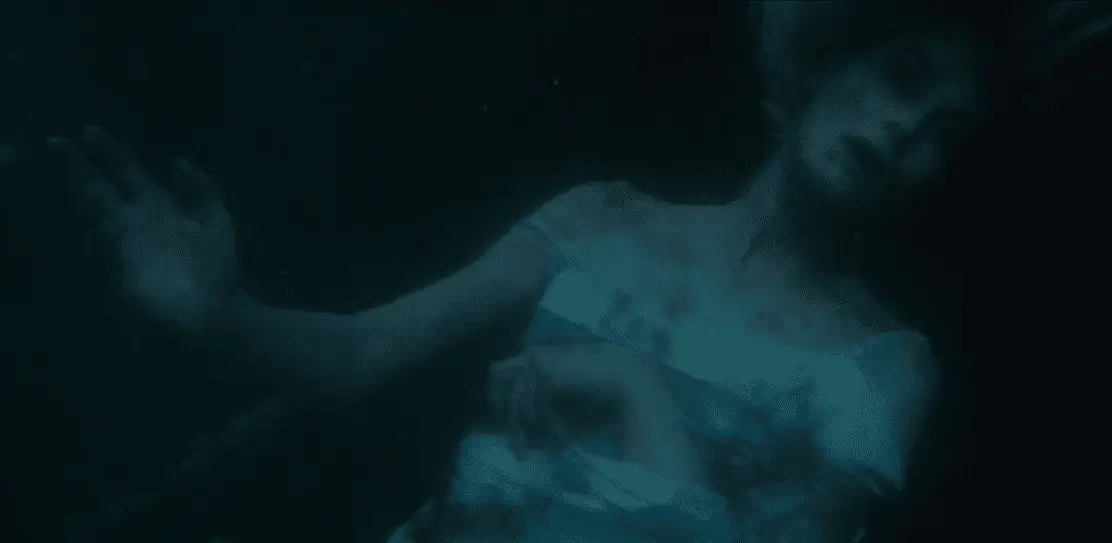Nick Dunne took my pride and my dignity and my hope and my money. He took and took from me until I no longer existed. That’s murder. Let the punishment fit the crime. – Amy Elliott Dunne, Gone Girl
Gone Girl’s Amy Elliott Dunne is one of the most fascinating antiheroines in recent memory. Of course, we don’t get to see very many of those. The proliferation of antiheroes—especially “Golden Age of Television” characters like Tony Soprano, Walter White, and Don Draper—have made it so that Bad Men Doing Bad Things have become commonplace in our media. These men are celebrated despite the fact that they are all unequivocally bad people, but it’s ok to enjoy their on-screen shenanigans (lying, cheating, murder, etc.) because they have been humanized in the context of their respective shows. I enjoy watching these guys as much as the next person, with the caveat that this behavior is not something to be respected or emulated.
And so when I first discovered Amy Elliott Dunne—first in the novel Gone Girl by Gillian Flynn and then in David Fincher’s film adaptation (also penned by Flynn)—I was absolutely in love. Finally, a Bad Woman Doing Bad Things that I could enjoy and celebrate in all her villainy. But before I get into why I adore the Amazing Amy Dunne, let me say this: Amy is a monster. She is a horrible person, a psychopath, a liar, and a killer. That said, she is in some ways horrifyingly relatable.
When I say that Amy is relatable, I’m not referring to her life circumstances—the poor little white woman made famous (and rich) by a series of books written about her. This is not a universal experience, and it’s one of the reasons why it’s very easy to hate her. She is the epitome of privilege. She’s stuck up and elitist and completely out of touch. What is relatable about Amy is her emotional response to her husband and her marriage: the fairytale romance that quickly devolved into a toxic relationship via money troubles and family problems; the lying, cheating, emotionally distant husband who “took and took from [her] until there was nothing left.” Again, this is not a universal experience, but the way that it all made her feel is something that I think a lot of people can relate to—that resentment and anger that festers in a dysfunctional marriage and that eventually, inevitably boils over.

What it all comes down to is this: Amy Elliott Dunne presents us with the ultimate female revenge fantasy. Her husband cheated on her and she wants him to pay for it. And who wouldn’t? But, because she is Amy, she can’t just go about things in a normal way. She could have publically shamed him for it, confronted his far-too-young mistress Andie, and/or ruined him financially in a divorce (after all, everything they had was bought with her money and she had an air-tight prenup). But no, not Amy Elliott Dunne. For Amy, the only option is the nuclear one: to stage her own murder and frame him for it.
It’s the sort of thing that no one in their right mind—even the smartest, most manipulative, most conniving woman in the world—would do. It’s inconceivable, but boy is it enjoyable to watch. Because Nick Dunne is not a good guy. He’s almost as insufferable as Amy is, though for entirely different reasons. Nick may have loved Amy once, but when the bright shiny early days faded into the monotony of married life, he got bored. The anniversary treasure hunts he once enjoyed became a torturous chore—a yearly reminder that he did not pay his wife the attention she deserved. Nick describes the hunts to his twin sister Margo as a “forced march designed to prove what an oblivious and uncaring asshole her husband is.” This interpretation is a far cry from their Year 1 treasure hunt in New York City, where they were on the same page and Nick knew all the answers and the two of them seemed annoyingly, disgustingly happy together.

Amy’s treasure hunts have not changed (at least until the Year 5 hunt); what is different is Nick’s response to them and his failure to get things right. Perhaps he wouldn’t feel as if they were a personal attack on him if he was engaged enough with his wife to solve her riddles. The one clue from Year 4 that he couldn’t solve was something very simple: “When your poor Amy has a cold, this dessert just must be sold.” It doesn’t seem like much of an ask for a husband to know what his wife likes to eat when she is sick, and yet Nick presents this as some sort of insurmountable obstacle, a completely unfair question setting him up to fail. In reality, he would know the answer if he bothered to pay her any attention.
Even Margo, who has never liked Amy, has to admit that a few years earlier he would have known the answer to that question. Nick’s response: “A few years ago it was fun.” This is why it’s incredibly satisfying to learn that for the Year 4 gift (flowers), Amy led Nick outside to a dying rose bush in their backyard. That flair for the dramatic, that perfectly symbolic gesture, is just so Amy, and you have to laugh. At the same time, it’s sad to think of her going to all the trouble she goes to for a man she knows no longer cares. Their marriage is dying and she is trying to save it, though it is a futile effort since at that point (although Amy likely didn’t know it yet) Nick was already cheating on her with Andie. And while his relationship with Andie was one cause of his being so distant, it’s not the only reason. Nick Dunne just stopped caring enough to try.
Nick was never truly honest with her, even in those early days. As he himself later admits, he was pretending to be the guy that he thought she wanted. And of course, the longer they were together, the more that lie unraveled. He settled into the man he actually is, and that guy isn’t what Amy signed up for. But Amy, too, was living a lie. They had that in common, at least. The instantly iconic “Cool Girl” monologue explains this perfectly and is another reason why Amy’s character is relatable. In the “Cool Girl” monologue, she gives voice to a feeling that I think a lot of people (especially women) have had: that urge to conform yourself to what your partner wants you to be—a level of perfection that is both unreasonable and unsustainable.
Nick and Amy will be gone. But then we never really existed. Nick loved a girl I was pretending to be. Cool Girl. Men always use that, don’t they? As their defining compliment. She’s a Cool Girl. Cool Girl is hot. Cool Girl is game. Cool Girl is fun. Cool Girl never gets angry at her man. She only smiles in a chagrin loving manner and then presents her mouth for fucking. She like what he likes.
When I met Nick Dunne, I knew he wanted a Cool Girl and for him, I’ll admit, I was willing to try. I wax-stripped my pussy raw. I drank canned beer watching Adam Sandler movies. I ate cold pizza and remained a size 2. I blew him, semi-regularly. I lived in the moment. I was fucking game. I can’t say I didn’t enjoy some of it. Nick teased out in me things I didn’t know existed. A lightness, a humor, an ease. But I made him smarter, sharper, I inspired him to rise to my level. I forged the man of my dreams.
We were happy pretending to be other people. We were the happiest people we knew. And what’s the point of being together if you’re not the happiest? But Nick got lazy. He became someone I did not agree to marry. He actually expected me to love him unconditionally then he dragged me, penniless, to the navel of this great country and found himself a newer, younger, bouncier Cool Girl. You think I’d let him destroy me and end up happier than ever? No fucking way. He doesn’t get to win.
Whatever your feelings about Nick, he obviously doesn’t deserve to be convicted and executed for a murder he didn’t commit. But there is something so incredibly satisfying about watching Amy torture him from afar, her perfectly conceived plan coming to fruition as her clueless husband stumbles into every trap she’s set for him. Amy knows Nick better than he knows himself (and certainly better than he ever knew her). She knows exactly what he will do in any given circumstance (and that is usually the wrong thing). Nick is not the brightest guy. He’s the kind of guy that smiles at a press conference about his missing wife and takes selfies with random groupie women volunteering to search for her to be close to the action. He is the kind of guy that screws around with his young college student in a small town and expects his Mensa-material wife not to find out about it. Say what you will about Amy Elliott Dunne, but she is an evil genius. Nick never had a chance once she set her mind to destroying him.

What Gone Girl (and Amy) does so perfectly is to exploit America’s obsession with true crime, especially when it comes to crimes against white women. The cable news show hosted by Ellen Abbott is instantly recognizable as a not-so-thinly veiled version of Nancy Grace, and Amy takes advantage of the fact that Ellen Abbott will no doubt latch on to Nick as the prime suspect in her disappearance/murder (which is exactly what happens). Part of Amy’s master plan is to craft a likable image of herself, which is fascinating in and of itself because it shows a certain level of self-awareness that we don’t see that often from Amy. Deep down, she knows she’s not particularly likable, and more importantly, she knows that the average American viewer will dislike her if she doesn’t create her own narrative.
Enter Noelle Hawthorne, the “local idiot” that Amy forges a secret friendship with, both to humanize herself and to provide evidence that Nick physically abused her. Of course, Nick never hurt Amy. He abused her emotionally, but he never touched her. But emotional abuse is a difficult thing to prove and isn’t as sensational as the battered wife narrative, so Amy has to craft the abuse via her diary entries and her conversations with Noelle. Noelle also has another important role: providing the urine that will allow Amy to have a pregnancy on her medical records. Because, as Amy says, “You need to package yourself so that people will truly mourn your loss, and America loves pregnant women.”
What I find so fascinating about Amy’s fake friendship with Noelle is that Nick truly had no idea, and that Amy’s plan was contingent on him having no idea. Think about how much time Amy must have spent alone at home to be able to forge a close friendship with a neighbor without her husband having the slightest clue. Nick runs his own bar and teaches part-time at the local community college; it’s not like he was so incredibly busy that he couldn’t have made time for his wife. But he didn’t. He was never there. He left her constantly alone, and for a woman like Amy, all that time alone—especially after she found out about Andie—left her with nothing but a lonely world of anger and bitterness and a brilliant bored brain. It is almost a given that she would use that brain for some type of evil machination. But when Detective Rhonda Boney asked Nick what his wife (“a woman with all those degrees”) does all day, all he could offer up was that she was “a voracious reader” and “always had a book in her hand.”
And, to be fair, she did always have a book in her hand, because she was studying how to get away with the perfect crime. But there was another, more important book in her hand, too: her diary. Amy’s dedication to her diary entries is one of the things that I, as a writer, find the most cunning part of her plan. Amy is brilliant (if only in a book-smart way, and I’ll get to that) but she is desperately bored. In New York City, before they both lost their writing jobs, Amy and Nick were happy. Amy was a city girl through and through, and corn-fed Midwestern boy Nick had adapted to city life (with her assistance and money, of course). But once their jobs were lost to the recession and Amy agreed to help her parents financially by giving them the majority of her trust fund money, things went downhill.
For Nick, this meant a lot of wallowing in his own misery and feeling sorry for himself. Amy tried to encourage him to write his novel, but to be honest, I don’t believe (and I don’t think she really believed) that he actually had a novel in him. Nick was a men’s magazine writer and Amy wrote personality quizzes—both perfectly respectable positions, but those things don’t necessarily translate to the ability to craft a compelling novel.
Things got even worse when Nick’s mother’s cancer diagnosis forced them to move back to his hometown of North Carthage, Missouri. The town, which once had a thriving economy due to a massive local mall and several factories, is now almost completely destitute as everything has shut down. There are no job prospects there for either of them, so Amy helps Nick and his twin sister Margo realize their dream and buys them a bar (named, what else, but The Bar). This leaves Amy with nothing to do and, as I’ve said before, for a woman as smart and dissatisfied as Amy that is a very dangerous situation.
What Amy proves (that Nick never does) is that she is the one who actually has the skill and discipline to write a novel, only her magnum opus takes the form of a mostly fictional account of their life together meant to solidify his guilt. The pride she must have taken in this—to know that she was crafting something he would never in a million years be capable of, designed solely to fuck him over—must have really been something. As Amy herself says, “And Nick thought he was the writer.”

What I find most interesting is one of the things that is often overlooked when we think of Amy’s master plan: the fact that it was conceived with her endgame being her own suicide.
And after all the outrage, when I’m ready, I’ll go out on the water with a handful of pills and a pocket full of stones, and when they find my body, they’ll know: Nick Dunne dumped his beloved like garbage. And she floated down past all the other abused, unwanted, inconvenient women.
Amy never planned to live much longer once her goal had been accomplished and I think this is key to understanding why she did what she did. It is understandable that she would be suicidal given the state of her life and her marriage. That is the kind of thing that would devastate anyone, but for Amy it would represent a personal failure on a massive scale, and failure is not something she would be able to handle. This is perhaps why she doesn’t take a normal option like divorce. To divorce Nick would be to admit defeat, and Amy doesn’t like to lose—especially to someone like Nick who she feels is beneath her.
And so she decides that she is going to kill herself, but not before staging one last elaborate “Fuck You I’m Smarter Than You” nightmare for Nick to live out. She can’t go until she knows that he’s been punished for what he did to her; he has to die, too. The likelihood of his conviction for murder given her plan is pretty high, but for the death penalty there would probably need to be a body. She was willing to provide one, to give her own life for his.

But as the plan moves along it’s intended path, she keeps pushing back her end date, moving the “KILL SELF” Post-It note later and later on her calendar of evil deeds. I think she’s just enjoying the charade too much to let go. She wants to watch it all play out. She needs to see him suffer for as long as she can. And this is where she hits a roadblock in the form of Greta and Jeff, two other residents at the hideout in the Ozarks where she’s holed up. Amy believed that by changing her appearance slightly and affecting a New Orleans accent, she could fool anyone, because Amy thinks she is always the smartest person in the room. Certainly she couldn’t be found out by people like Greta and Jeff, who she would consider even farther beneath her than Nick.
But while Amy has book-smarts in spades, what she lacks is any form of street smarts. It doesn’t take Greta and Jeff long to figure out that she is not who she says she is (although they don’t seem to recognize her as the Amy Dunne all over the news). What they do know, however, is that she is sitting on a wad of cash and she will have no recourse if they take it from her, which is exactly what happens. It is at this point that Amy’s carefully plotted and perfectly executed plan completely unravels. She thought she was too smart to fail, but with Greta and Jeff having taken all her funds and bound to put two and two together regarding her identity, she has to flee, penniless, and figure out a Plan B.
That Plan B is Desi Collings, who is the only person in the world she knows that she can trust. She also knows that she can manipulate Desi into believing whatever she wants him to believe about her situation, and so she calls him with a desperate plea for help, playing the role of the abused wife so terrified that she had no choice but to fake her own disappearance to get away from her evil husband. And he falls for it, as she knew he would, only she neglected to realize that Desi now has her exactly where he wants her: tucked away at his lake house, unable to leave, forced to do exactly what he wants her to do in order to maintain her lie.
Desi wants Amy to be the same woman she used to be, and to that end he buys her clothes and hair dye and “encourages” her to work out—basically he forces her to become the old Amy—the woman he’s been obsessed with for years. The version of Amy that comes to him desperate has gained weight and cut and box-dyed her hair mouse-brown in order to fade into the background. What Desi wants is the beautiful, blonde-haired, glamorous, size 2 Amy Elliott that he has loved obsessively since high school. For Amy, this is just a new, different version of being trapped under the thumb of a man, and she cannot abide it.
So she plays along because she has to, but she is a caged animal with no means of escape. But when she finally sees Nick go on national television on the Sharon Schieber show, things change for her. Nick has finally wised up and realized that Amy is out there, watching his every move, and that the only way to get himself out of the situation is to make a plea directly to her. His lawyer Tanner Bolt, patron saint of murdering husbands everywhere, has set up the interview to rehabilitate Nick’s image, coached him on what to say (and what not to say), and Nick uses this as a way to speak to Amy and give her what she wants: an admission of guilt, an acceptance of the fact that he’s not a good guy, and perhaps most importantly, the knowledge that in the end he is actually smart enough to play her game and solve her puzzle. When Amy sees this, she sees the version of Nick that she wants. She also sees that Nick finally sees her for who she is, that he understands her, and so she devises a plan to get out from under Desi and back to Nick.
Of course, being Amy, her plan is a false rape accusation and murder (which she will claim was self-defense). She has memorized exactly where Desi’s security camera angles are and she stages a rape. She then pounces on Desi and has sex with him (purely for the physical evidence necessary) and slits his throat with a box cutter as he climaxes. It’s truly a horrifying scene. The only emotion Amy displays throughout the entire plot is play-acting for the cameras and a feigned desire for Desi in order to initiate sex. In this moment, the monster is on full display. It is no longer enjoyable to root for Amy. As much of a creep as Desi is, this is beyond the pale.

It is worth noting that this is not Amy’s first foray into false rape accusations. Back in New York, before she met Nick, she dated a man named Tommy O’Hara. When the relationship went south and he grew distant from her, she staged a rape and then pressed charges on him. This, too, is monstrous and predates her relationship with Nick. Amy has always been capable of pure evil; she is just excellent at hiding it. I can enjoy Amy’s mind-games and master manipulation (and I very much do), but I draw the line at crying rape and murdering people. This is not dissimilar from my ability to enjoy the various triumphs of Walter White in Breaking Bad, outwitting his foes with his intellect, but drawing the line at his poisoning children and murdering people for his own personal gain.
Sometimes we love our monsters but we have to be able to look at them objectively. Walter White is a terrible person. Amy Elliott Dunne is pure evil. And yet they entertain me as they horrify me. There’s a difference between enjoying a character and believing that what they are doing is the right thing just because they are enjoyable to watch. I can say that I love the character of Amy Dunne because she represents something that is so rarely celebrated on screen: unbridled female rage and a female villain who wins in the end.
Because she does win. She goes back to Nick and everyone (except Nick, Margo, Tanner Bolt, and Detective Boney) buys her story. She uses Nick’s frozen sperm to get pregnant and, just like that, she has Nick right where she wants him forever (or at least for the next 18 years). The whole ordeal has given her a renewed fame, not as the Amazing Amy of her parents’ children’s books but as the Amy she crafted herself—a narrative she has written. Their money troubles will inevitably be solved by the books and Lifetime movies and interviews and everything else that comes with notoriety and victimhood in American media. She is set for life, as long as Nick plays along, and she knows he won’t leave because he would never leave his child.
But it’s more than that: Nick and Amy are horrifyingly perfect for each other. He won’t leave her because a part of him doesn’t want to, even despite all of the truly evil things she’s done and the fact that he knows without a doubt that she is a murdering psychopath. But in the end, Nick knows that he can never truly escape her, that they are connected forever, not just by a child but by the horrible things they have done to one another and the terrible secrets they keep. In the end, Amy Elliott Dunne is Nick’s favorite monster, and he will stay with her asking himself, “What are you thinking? How are you feeling? What have we done to each other? What will we do?”



Great article, you wrote it a long time ago but you deserve a comment telling you that. I was revisiting this movie on Netflix and I was reminded once again how good David Fincher is, and how awesome Gillian Flynn book (and script is). Congrats!